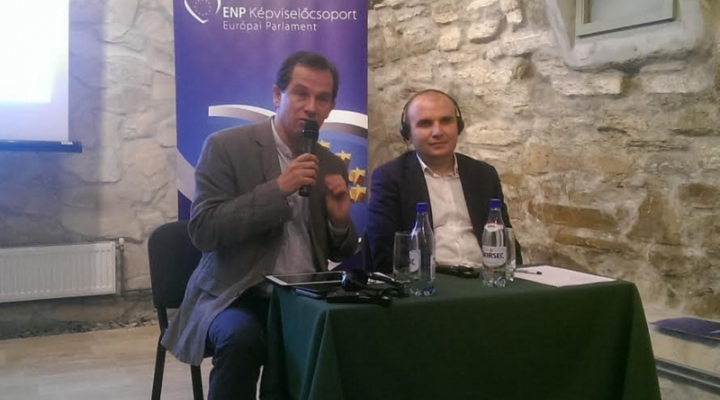The representative of the Turskish minority from Bulgaria hosted by Csaba Sógor in Cluj Napoca
Ilhan Kyuchyuk, the Turkish MEP from Bulgaria was introduced in the situation of the Hungarian minority in Romania and was informed about the specific problems of this community faces. The liberal politician visited Cluj Napoca upon the invitation of Csaba Sógor, RMDSZ MEP, holding a presentation on the 26th of June as a part of the European Talking Nights series, organised in cooperation with the Andor Járosi Cultural Workshop.
Ilhan Kyuchyuk is coming from a country having a population of eight million people, where the size of the minority is estimated at approximately one million, of which the Turkish one is the biggest with around six hundred people, followed by the Roma minority with around three hundred people. His Party, the Movement for Rights and Freedom (DPS) is a political group that is not based on ethnic grounds, as the Bulgarian constitution forbids the foundation of political parties on an ethnic or religious basis. Founded in 1990, the DPS is a party that is committed to the representation of the whole society, therefore being able to address efficiently all of its elements, not just their own, but also placing emphasis on the prosperity and legal certainty of autochthonous minorities.
MEP Csaba Sógor has given information to his invited colleague about the demographic situation of the Hungarian minority in Romania, their political representation, the opportunities ensured by Romanian legislation and the deficiencies met in its application. Comparing the situation of the two minority communities, Ilhan Kyuchyuk has mentioned that the Bulgarian Turkish people use their own culture and native language within their families and friends’ groups. The Turkish Bulgarian MEP explained that, although insisting on the rights to its traditions and native language, his ethnic group tries to avoid conflicts between ethnic groups and is seeking to have a balanced relationship between minority and majority. They think everyone has the same target: they would like to live a better life in their homeland.
The MEP also related the fact that the Turkish community in Bulgaria does not have the possibility to study in its native language in schools, only having the possibility to attend Turkish courses as a chosen language, therefore the community is more prone to assimilate the language and culture of the majority. Ilhan Kyuchyuk has also pointed out that, while Hungary is trying to support the situation of the Hungarian minority in Romania, Turkey does not ensure any support for the rights and conditions of the Turkish minority in Bulgaria.
As a result, they are faced with the problem, that there are more and more empty Turkish villages in Bulgaria. Searching for better opportunities, many members of the Turkish minority have migrated within the country, for example a large number of students are going to study in Sofia and they do not return to their hometowns. Ilhan Kyuchyuk has also mentioned another big challenge of the Turkish community: that parents have started to follow the one-child-family model.
Csaba Sógor and Ilhan Kyuchyuk agreed on the fact that, although every national minority group has a unique interpretation of their situation and relationship with the majority, it would also be important to handle this problem not only on a national, but also on a EU level. They also agreed, that the practical application of the Council of Europe's recommendations need to be insisted upon and that in the EP the situation of the national minorities - one of the most vulnerable groups - should be held constantly on the agenda.











